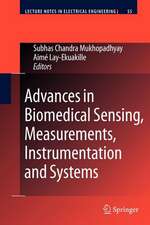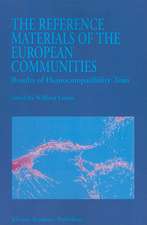Immunomodulatory Biomaterials: Regulating the Immune Response with Biomaterials to Affect Clinical Outcome: Woodhead Publishing Series in Biomaterials
Editat de Stephen F. Badylak, Jennifer Elisseeffen Limba Engleză Paperback – 30 iul 2021
Immunomodulatory Biomaterials: Regulating the Immune Response with Biomaterials to Affect Clinical Outcome offers a single, comprehensive reference on biomaterials for modulation of the host response, for materials scientists, tissue engineers and those working in regenerative medicine. This book details methods, materials and strategies designed to regulate the host immune response following surgical implantation and thus facilitate specific local cell infiltration and tissue deposition.
There has been a dramatic transformation in our understanding of the role of the immune system, both innate and adaptive; these changes include recognition of the plasticity of immune cells, especially macrophages, cross-talk between the immune system and stem cells, and the necessity for in situ transition between inflammatory and regulatory immune cell phenotypes. The exploitation of these findings and the design and manufacture of new biomaterials is occurring at an astounding pace. There is currently no book directed at the interdisciplinary principles guiding the design, manufacture, testing, and clinical translation of biomaterials that proactively regulate the host tissue immune response.
The challenge for academia, industry, and regulatory agencies to encourage innovation while assuring safety and maximizing efficacy has never been greater. Given the highly interdisciplinary requirements for the design, manufacture and use of immunomodulatory biomaterials, this book will prove a useful single resource across disciplines.
- Holistically covers the design, manufacture, testing, and clinical translation of biomaterials that proactively regulate the host tissue immune response
- Provides a single reference for understanding and utilizing the host response in biomaterials design
- An international collaboration of leading researchers in the field offering a novel insight into this fast-growing area
Din seria Woodhead Publishing Series in Biomaterials
- 5%
 Preț: 1209.61 lei
Preț: 1209.61 lei - 9%
 Preț: 1288.81 lei
Preț: 1288.81 lei - 20%
 Preț: 1116.12 lei
Preț: 1116.12 lei - 36%
 Preț: 1030.16 lei
Preț: 1030.16 lei - 5%
 Preț: 1403.92 lei
Preț: 1403.92 lei - 26%
 Preț: 990.05 lei
Preț: 990.05 lei - 5%
 Preț: 1047.40 lei
Preț: 1047.40 lei - 5%
 Preț: 1097.68 lei
Preț: 1097.68 lei - 36%
 Preț: 847.30 lei
Preț: 847.30 lei - 9%
 Preț: 1159.07 lei
Preț: 1159.07 lei - 5%
 Preț: 1341.04 lei
Preț: 1341.04 lei - 5%
 Preț: 1116.94 lei
Preț: 1116.94 lei - 5%
 Preț: 1115.67 lei
Preț: 1115.67 lei - 20%
 Preț: 901.66 lei
Preț: 901.66 lei - 5%
 Preț: 1114.31 lei
Preț: 1114.31 lei - 26%
 Preț: 903.89 lei
Preț: 903.89 lei - 36%
 Preț: 939.94 lei
Preț: 939.94 lei - 5%
 Preț: 1511.72 lei
Preț: 1511.72 lei - 5%
 Preț: 1071.15 lei
Preț: 1071.15 lei - 9%
 Preț: 1090.57 lei
Preț: 1090.57 lei - 9%
 Preț: 1044.12 lei
Preț: 1044.12 lei - 29%
 Preț: 847.49 lei
Preț: 847.49 lei - 9%
 Preț: 1003.98 lei
Preț: 1003.98 lei - 5%
 Preț: 1050.99 lei
Preț: 1050.99 lei - 5%
 Preț: 1600.80 lei
Preț: 1600.80 lei - 5%
 Preț: 986.00 lei
Preț: 986.00 lei - 5%
 Preț: 1118.83 lei
Preț: 1118.83 lei - 5%
 Preț: 1050.99 lei
Preț: 1050.99 lei - 20%
 Preț: 1038.08 lei
Preț: 1038.08 lei - 5%
 Preț: 902.90 lei
Preț: 902.90 lei - 9%
 Preț: 1070.42 lei
Preț: 1070.42 lei - 5%
 Preț: 1512.75 lei
Preț: 1512.75 lei - 29%
 Preț: 1282.87 lei
Preț: 1282.87 lei - 25%
 Preț: 1121.07 lei
Preț: 1121.07 lei - 5%
 Preț: 1253.32 lei
Preț: 1253.32 lei - 9%
 Preț: 1204.85 lei
Preț: 1204.85 lei - 26%
 Preț: 1046.86 lei
Preț: 1046.86 lei - 5%
 Preț: 835.44 lei
Preț: 835.44 lei - 5%
 Preț: 838.79 lei
Preț: 838.79 lei - 5%
 Preț: 940.93 lei
Preț: 940.93 lei - 20%
 Preț: 1290.67 lei
Preț: 1290.67 lei - 5%
 Preț: 940.63 lei
Preț: 940.63 lei - 5%
 Preț: 1115.22 lei
Preț: 1115.22 lei - 5%
 Preț: 989.25 lei
Preț: 989.25 lei - 20%
 Preț: 1598.75 lei
Preț: 1598.75 lei - 20%
 Preț: 964.40 lei
Preț: 964.40 lei - 20%
 Preț: 903.00 lei
Preț: 903.00 lei - 5%
 Preț: 1333.41 lei
Preț: 1333.41 lei
Preț: 1055.90 lei
Preț vechi: 1328.87 lei
-21% Nou
Puncte Express: 1584
Preț estimativ în valută:
202.04€ • 210.97$ • 166.84£
202.04€ • 210.97$ • 166.84£
Carte tipărită la comandă
Livrare economică 08-22 aprilie
Preluare comenzi: 021 569.72.76
Specificații
ISBN-13: 9780128214404
ISBN-10: 0128214406
Pagini: 294
Ilustrații: 85 illustrations (15 in full color)
Dimensiuni: 152 x 229 mm
Greutate: 0.4 kg
Editura: ELSEVIER SCIENCE
Seria Woodhead Publishing Series in Biomaterials
ISBN-10: 0128214406
Pagini: 294
Ilustrații: 85 illustrations (15 in full color)
Dimensiuni: 152 x 229 mm
Greutate: 0.4 kg
Editura: ELSEVIER SCIENCE
Seria Woodhead Publishing Series in Biomaterials
Public țintă
Academic and industrial researchers as well as postgraduate students of materials science and regenerative medicine.Biomedical engineers
Cuprins
1. Engineering physical biomaterial properties to manipulate macrophages phenotype: From bench to bedside
2. Early factors in the immune response to biomaterials
3. Nanotechnology and biomaterials for immune modulation and monitoring
4. Immune-instructive materials and surfaces for medical applications
5. Electrospun tissue regeneration biomaterials and immunomodulation
6. Biomaterials and immunomodulation for spinal cord repair
7. Biomaterial strategies to treat autoimmunity and unwanted immune responses to anti-drug antibodies and transplanted tissues
8. Lipids as regulators of inflammation and tissue regeneration
9. Biomaterials modulation of the tumor immune environment for cancer immunotherapy
10. Circumventing immune rejection and foreign body response to therapeutics of type 1 diabetes
11. Machine learning and mechanistic computational modeling of inflammation as tools for designing immunomodulatory biomaterials
2. Early factors in the immune response to biomaterials
3. Nanotechnology and biomaterials for immune modulation and monitoring
4. Immune-instructive materials and surfaces for medical applications
5. Electrospun tissue regeneration biomaterials and immunomodulation
6. Biomaterials and immunomodulation for spinal cord repair
7. Biomaterial strategies to treat autoimmunity and unwanted immune responses to anti-drug antibodies and transplanted tissues
8. Lipids as regulators of inflammation and tissue regeneration
9. Biomaterials modulation of the tumor immune environment for cancer immunotherapy
10. Circumventing immune rejection and foreign body response to therapeutics of type 1 diabetes
11. Machine learning and mechanistic computational modeling of inflammation as tools for designing immunomodulatory biomaterials

















